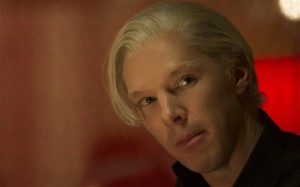film review: the fifth estate
After watching The Fifth Estate, I completely understood why Julian Assange, who it was based on, hated the film. It felt like a one-sided character assassination, portraying Assange as a manipulative, sleazy and egotistical man.
Given that the notoriety of Assange’s leaks are well documented, I can understand why this film does not focus on pivotal events in his life, such as his not-quite extradition to Sweden or his taking refuge in the Ecuadorian embassy in Britain. Instead, The Fifth Estate is built on the assertion given by Jemima Khan, one of the producers of We Steal Secrets (an American documentary about Wikileaks), that ‘a noble cause is not necessarily a guarantee of a saintly leader’.
Is it wise to make a martyr out of someone who is not yet dead? Apparently Bill Condon, the director of this film, thinks not. Which is why the focus of the film is largely on Assange’s sizeable idiosyncrasies and how he treats his friend and confidant, protagonist Daniel Domscheit-Berg, rather than the remarkable things he has achieved.
Throughout the film Assange displays a tunnel vision-like focus on the noble philosophy of ‘complete transparency for corporations, complete privacy for the individual’. And yet I was totally baffled that he threw a tantrum when a magazine named Domscheit-Berg as co-founder of Wikileaks. The film is full of moments like this: Assange embodies the ideal of the whistleblower in that he is prepared to put himself on the line for a higher cause, and then stamps his foot with child-like rage when someone else gets the credit.
Much like the Michael Moore documentaries Bowling For Columbine and Fahrenheit 9/11, I enjoyed viewing contemporary events coupled with a kind of narrative and in chronological order. This film was told with the overarching theme that good intentions and deeds do not necessarily make a good person.
I’m not sure that this notion is important or even relevant. At one point in the film, Assange alludes to the massive personal smear campaign that will no doubt be directed at him from the likes of Fox News in response to his leaks. This film feels all too much like a cog in that same ad hominem machine. In glossing over the impacts of Assange’s revelations and focusing on the man himself, this film feels opportunistic and decidedly one-sided. Julian Assange may have treated his friend very badly. His friend then turned it into a money-making venture.
Yes, it’s an interesting story. However, if this ends up informing history (as inaccurate movies can do) it would be a great pity. Ultimately, if Assange is a complete prick, does that really matter?


